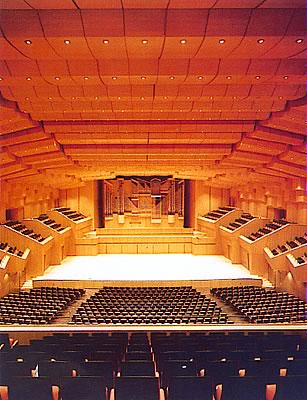
Megaron, the Athens Concert Hall
Vas. Sofias Ave. and Kokkali St, Athens, 1973-1991
Architect of the initial design, 1973-79:
Emmanuel Vourekas (1905-1992)
Acoustics consultant:
Heinrich Keilholz
Architects of the final design:
"E. Vourekas Ltd."
Elias Skroumbelos (1921-)
Architects who amended and applied the design:
Firm of K. Kyriakidis and Associates S.A. –
N. Scholidis and "Design Group V.K. Sgoutas Ltd" (Vassilis
Sgoutas, Th. Strongylos, S. Tzanetatou)
Consultants to the client:
R. Krogmeyer and architect professor Panos Tzonos
The Athens Concert Hall, which was completed after
37 years of effort, is the foremost event in the musical history of
the country. Its value as a building is considerably less, as despite
its luxury and advanced technology, it is not an inspired building.
The effort to build this Hall started in 1954 on the initiative of the
famous mezzo-soprano Alexandra Trianti and with the financial support
of the politician L. Eftaxias. Its foundation, designed by architect
Emmanuel Vourekas, was laid in 1976 and the construction works, which
were financed by the "Friends of Music" society, ceased in
1979 when the concrete frame was completed. The work continued later
with state funding and with the support of the Minister of Culture Melina
Mercouri. The final phase was completed in 1987-91 on the initiative
of the art-loving publisher Christos Lambrakis and contributions from
many sponsors.
The luxury of its interiors and its high-tech equipment are the most
characteristic features of the building. It has two concert halls, a
large one with a capacity of 2000 spectators and the small one with
a capacity of 500. The large hall, initially designed for symphony concerts,
was redesigned to make it adaptable to other performances, such as opera,
theatre productions and conference events. It is built of movable wood-panelled
vertical sections which, when withdrawn, can increase the stage area,
according to the demands of each performance. The large hall is equipped
with sophisticated audio-visual systems and is famed for its flawless
acoustics.
The small hall in the basement has similar features and audio-visual
perfection. The foyer of the large hall is two storeys high, and in
the basement there is a luxury restaurant and a shop that sells recorded
music and books. The Athens Concert Hall also houses a music library,
musical research centre, administration and office areas, dressing rooms
and many auxiliary areas.
The rectangular volume of the building, the colonnade on the façade
with its heavy twin piers, the sheeting of the exterior with white Pentelic
marble and the large windows express the effort to reinterpret neoclassical
models by using modern means of expression.
TRANSPORTATION
